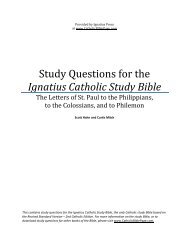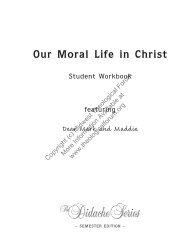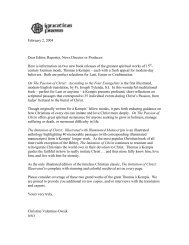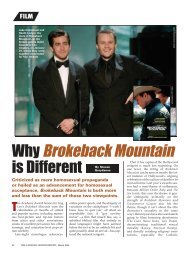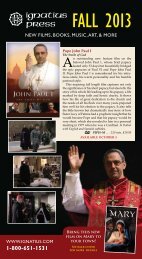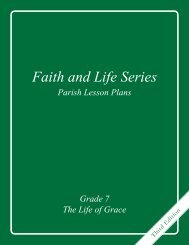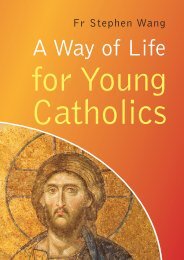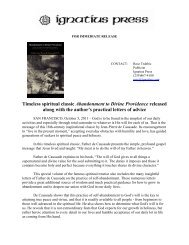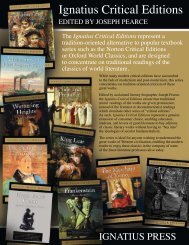Discussion Questions after viewing Cosmic Origins
Discussion Questions after viewing Cosmic Origins
Discussion Questions after viewing Cosmic Origins
Create successful ePaper yourself
Turn your PDF publications into a flip-book with our unique Google optimized e-Paper software.
Outline of <strong>Cosmic</strong> <strong>Origins</strong>I. Introductory question: Where did we come from?II. The Big Bang as the Best Scientific Explanation for the Beginning of the CosmosIII. Theories about the Universe Before the Big Bang• Bouncing Universe Theory• Eternal Inflation Theory• Ekpyrotic Theory• Multiverse TheoryIV. Random Existence vs. a Finely-Tuned CosmosV. The Metaphysical Perspective: From Nothing Nothing ComesVI. A Grand Design? Science, Faith, and PurposeVII. What do you think?<strong>Discussion</strong> <strong>Questions</strong> <strong>after</strong> <strong>viewing</strong><strong>Cosmic</strong> <strong>Origins</strong>:1. Does the latest thinking in science tell us about the cosmos and its origin?2. Since no human being was around to witness the beginning of the universe, how do scientistsknow anything about it?3. What evidence do scientists use to support the idea that the universe had a beginning?4. What other theories do scientists present to suggest that something existed before the BigBang? What are the limits of such theories?5. It seems as if there are three possibilities regarding the conditions for the universe to sustainlife: (1) these conditions are the result of a random accident (chance); (2) the conditions just hadto exist somewhere (necessity); or (3) the conditions were deliberately established by a powerful,intelligent agent (purpose). Which of the three possibilities makes the most sense to you?6. What do you think of the idea that science can’t explain everything? Do you agree or disagreewith the idea that the limits of science don’t correspond to the limits of what can be known?Why?7. Does the fact that the more we explore the universe the more intelligible it is discovered to be,suggest anything to you about whether reality is ultimately meaningful? About whether there isan Intelligence Agent or Supreme Being behind the universe?8. Sometimes people speak of “inventing meaning” or “giving purpose” to existence. Can“meaning” be “invented”? Can purpose be “given” to existence? Or are meaning and purposethings that must be discovered rather than created? Explain.9. In order to make sense, do ideas such as right and wrong, justice and compassion, depend onthere being meaning or purpose to the universe? What does your answer suggest about whetherGod exists?1
God and the Big Bangby Mark Brumley“In the beginning God created the heavens and the earth,” declares Genesis 1:1. Manypeople read that statement as a description of what scientists today call “the Big Bang”.But is it? Even certain scientists talk as if it were. The late astronomer Robert Jastow, in apopular book called God and the Astronomers, penned lines now famous in discussions ofthe Big Bang and God: “For the scientist who has lived by his faith in the power of reason,the story ends like a bad dream. He has scaled the mountains of ignorance; he is about toconquer the highest peak; as he pulls himself over the final rock, he is greeted by a bandof theologians who have been sitting there for centuries”.In other words, when scientists go back to the Big Bang, they wind up at precisely thesame spot where theologians have been all along. But are theologians and the scientistssitting at the same spot, when it comes to the origin of the universe? Does the Big Bangpoint to the creation of the universe by God from nothing?In the film <strong>Cosmic</strong> <strong>Origins</strong>, scientists, philosophers, and theologians consider the evidencefor the Big Bang, whether it represents the beginning of the universe, and, if so,whether it implies a Creator. Many of the film’s participants regard the Big Bang as pointingto a beginning of the universe. But they’re tentative about the matter, recognizing thatscience is open-ended; the standard scientific model today may be surpassed tomorrowby a different theory, one that doesn’t imply or suggest a beginning of the universe.Creation and the BeginningSome people—both believers and non-believers—may be surprised to learn that the debateover whether the universe began isn’t new. It was a lively issue in the ancient world.Many ancient pagan thinkers believed the universe existed from all eternity. Something,they argued, can’t come from nothing. If something—the universe—exists now, thensomething must always have existed.Judaism and Christianity, on the other hand, have generally rejected the idea of an eternalcosmos, whether as it is now or in some other form. Ancient Jews and Christians generallyregarded Genesis 1:1 as meaning God caused the universe to begin to exist. Jewishand Christian thinkers agreed with pagan philosophers that something can’t come fromnothing. But, they insisted, God created the world ex nihilo—from nothing. He broughtthe universe into existence, so the “something” of the universe came from the Something(Someone) who is God, even though God didn’t use anything to create the world.To be sure, even Jewish and Christian thinkers were not, initially, as clear about what itmeans to say God created the world from nothing as later theologians would be. “Nothing”,it turns out, is a difficult idea to wrap one’s mind around. Still, Jews and Christianswere convinced that God was all-powerful and sovereign. As such, he could not haveneeded to rely on something else in order to bring the world into being. God’s being the2
only source for the whole of the universe is, in essence, what it means to say he createdthe world from nothing.A straightforward reading of Genesis 1:1 seems to show not only that God created theworld from nothing, i.e., that God alone is the reason why the cosmos exists, but that hecreated in such a way that the universe had a beginning: “In the beginning, God createdthe heavens and the earth …” (emphasis added). It may seem obvious that if God createdthe world from nothing that the world had a beginning. Unfortunately, the matter is notso simple.In the Middle Ages, philosophers and theologians debated whether the world had a beginningor had existed from eternity, and whether we could know, one way or the other,from reason alone. The Fourth Lateran Council of the Catholic Church, in 1215, taughtthat God, “at the beginning of time”, created the universe “from nothing”. However, itleft open the question of whether reason alone could know this truth or whether it requiresfaith.The great thirteenth-century medieval philosopher St. Thomas Aquinas insisted thatreason by itself can’t settle the issue, even though he also believed as a matter of faith thatthe universe had a beginning. St. Thomas held that we can know from reason alone thatGod originated the universe, but not that he did so in a way that required the universe tohave a beginning. How, one might ask, could the universe have an origin without havinga beginning?Consider an eternally burning lamp from which streams forth rays of light. The originof the light rays is the lamp, yet because the lamp is said to have been eternally burning,there is no beginning to the light’s streaming forth. By analogy, we might think of God asbeing like an eternal lamp and the universe as being like the light eternally coming fromit. Thus, even if the universe had always existed, it still required God as the cause of its havingalways existed and the cause of its continuing to exist for as long as it exists. In this way,Aquinas developed a distinction between the universe having an origin and its having abeginning.Aquinas regarded God as the Creator of the universe but he used the term creation differently,depending on whether he was speaking as a philosopher, basing his argumentson reason alone, or as a theologian, using reason but appealing to divine revelation as hisstarting point. As a philosopher, Aquinas argued that “creation” refers to the world’s existingas a result of God’s causing it to be, whether or not God had caused it always to be.As a theologian, Aquinas held that “creation” refers to God bringing the world into beingin such a way that it had a beginning.What is the difference between God creating the world in the philosophical sense of originatingit and God creating the world in the theological sense of beginning it? A tempting butfalse answer is to suppose that at some point in time “eternity past” God decided to bringthe world into being and since then the world has existed. Notice that this idea posits a3
time before God created the world and a time <strong>after</strong> he did so. The trouble with this view, accordingto Aquinas (and Augustine, whom he follows on the point), time is also a creationof God, as everything else in the universe is.In Book Eleven of his Confessions, the fifth-century saint, theologian, and bishop Augustineof Hippo addressed the question “What was God doing before he made heavenand earth?” In other words, what was he doing before he created the world? Augustinerefused to give the glib, evasive answer often wrongly attributed to him: God was preparinghell for those who ask such questions. Instead, Augustine argues that God is beyondthe limitations of time and has no “before”. Time exists as a part of the world God created.Apart from creation, time does not exist and therefore it is not meaningful to speak ofwhat happened “before” creation. Time began with the creation of the world.Aquinas held the same position as Augustine. It is not possible, according to Aquinas,to speak meaningfully about God creating the world at some point in time. There is noperiod “before” the world began. Yet if this is so, what does it mean to talk about a beginningof the world? In our everyday experience, there is a “before” something begins andan “<strong>after</strong>”. How could the universe have a beginning without a “before”?One way to approach the question is to think about what it would mean if the universehad no beginning. If God has always been originating the universe—always causing it tobe, so that it had no beginning—then the history of the universe would be infinite. Thenumber of events making up the universe’s history would be limitless. On the other hand,if the universe had a beginning, then its history would be limited. However large the totalnumber of events in the universe’s history would be, it would be finite.To say that the universe had a beginning, then, doesn’t mean there was a time whenit didn’t exist and God then brought it into being—that would amount to a time beforetime, which makes no sense. That the universe had a beginning means the history of theuniverse is finite; a limited number of events have occurred.So we don’t leave the wrong impression we should underscore that Aquinas did notthink the world existed from eternity. He believed it had a beginning, as we have said. Buthe believed it on the basis of God’s revelation—the Bible as interpreted by the Church—not on the basis of what reason could tell us apart from revelation. As we have seen,Aquinas thought reason couldn’t resolve the matter, either way.Another PerspectiveNot every medieval philosopher and theologian agreed with St. Thomas Aquinas that thebeginning of the universe couldn’t be demonstrated. Various thinkers made their case fora beginning, although they did not argue as many modern thinkers do, based on scientificideas such as the Big Bang. The medieval argument for a beginning held that it wasimpossible for the universe to have always existed. Not even God, it was claimed, couldhave made the universe eternal.4
Usually, the argument was part of a larger argument for God as the cause of the universe’sbeginning. One form of the argument came from Islamic philosophers and someChristian thinkers (St. Bonaventure, for one). The argument is called the Kalaam argument.One premise of the argument is that the world must have had a beginning, otherwise aninfinite number of moments would have transpired. An infinite number of moments, so itwas argued, is an actual infinity, and an actual infinity is impossible—it can’t exist in reality.(We can’t go into here why this was thought to be so.) Therefore, the universe cannotalways have existed; it must have had a beginning.As you might expect, not everyone agreed that an infinite number of moments amountsto an actual infinity or that an actual infinity is impossible, even for God. Even today,philosophers and theologians debate the issue. What’s new to the modern discussion isthat science seems to have something to say about whether the universe had a beginning.Does it? And what, if anything, do scientific ideas about the cosmos tell us about God?The Universe, Science, and GodModern science developed in a Christian context, as historian of science Father StanleyJaki and others have shown. Many early scientists were devout believers—people suchas Galileo, Newton, and Kepler, to name a few. But for a variety of reasons having to dowith the secularization of Western culture, many scientists in the last two centuries or socame to reject a Christian worldview and adopted a kind of materialism as their basic philosophy.For them, the idea that the universe had a beginning was unacceptable becausea beginning implied the existence of the Creator. They presupposed a more or less static,eternal universe, which eliminated the need for God—or so they thought.Not all scientists who adopted the idea of an eternal universe were atheists or agnostics.Some were pantheists. Pantheism holds that God and the universe are more or less thesame thing: God is the cosmos and the cosmos is God. Some scientists thought of Godas an impersonal Supreme Spirit or Mind behind the universe, the one responsible for theorder of the cosmos yet not someone who created it at some point in the past; the universewas eternal as God was thought to be. Such was Albert Einstein’s view of the universeand God.In the early 20th century, Einstein proposed his General Theory of Relativity. Soon Einsteinand others applied it to questions of cosmology. Several scientists, including theBelgian Catholic priest George Lemaitre, insisted that according to General Relativity,the universe should not be static—it should either be collapsing or expanding. Initially,Einstein rejected the idea, based largely on his own philosophical preferences rather thanevidence. However, <strong>after</strong> the astronomer Edwin Hubble showed in the 1920s the existenceof other galaxies and evidence emerged that these galaxies were receding from theearth and each other, it became clear that the universe was not static; it was expanding.The expanding universe supported the idea proposed by Lemaitre that the history ofthe universe could be traced back to an initial state, a kind of “primordial atom”. The5
“decay” of this “atom” from its condition of immense density and extreme heat led tothe development of the universe as we know it today. Lemaitre’s theory was eventuallymodified and came to be called the Big Bang Theory.Some scientists interpreted the Big Bang idea as pointing to a beginning of the universe.Those who for philosophical reasons preferred an eternal universe proposed alternativeideas, such as the Oscillating Universe Model or Bouncing Universe Model, in which theuniverse goes through eternal cycles of expansion and contractions. The universe “explodes”in the Big Bang. Eventually, the expansion of the “bang” slows and reverses itself.The universe contracts into a Big Crunch, and then “explodes” again into another BigBang.Perhaps the most famous alternative model to a universe with a beginning was theSteady State Theory, proposed in the 1940s. According to this model the universe is withoutbeginning or end. The expansion of the universe is the result of new matter constantlycoming into existence. For a time, the Steady State Theory was a serious contender as analternative to the Big Bang, although a number of scientists pointed to basic problemswith the theory. In 1964, Arno Penzias and Robert Wilson, two Bell Labs scientists, discoveredwhat has become known as the <strong>Cosmic</strong> Microwave Background Radiation, a lowtemperament “blanket” of radiation permeating the universe. Such radiation had beenpredicted as a consequence of the Big Bang, an energy “echo” of the original event. Mostscientists regarded this discovery as confirmation of the Big Bang Theory and a refutationof the Steady State Theory.Although the Big Bang Theory is now the standard model, scientists still debate whetherit represents the beginning of the cosmos, or simply the beginning of the current stageof its history. Early on, as we saw, scientists tried to combine the Big Bang with an eternaluniverse in the form of the Oscillating Universe or the Bouncing Universe. The SecondLaw of Thermodynamics—the principle that the amount of available, “useful” energydiminishes over time—seems to pose an insurmountable obstacle by limiting the numberof oscillations or bounces the universe can have. As we go backward in time, so theargument goes, eventually we must come to an initial “bang” that began the oscillatingseries—if such a series existed. Not all scientists agree with that analysis, though.Whether the Big Bang represents a true beginning of the universe is also linked to thequestion of the cosmic “singularity” the Big Bang Theory seems to require as the initialstate of the universe. According to Einstein’s Theory of General Relativity, if we run theclock backward and condense all the matter and energy in the universe back to an initialstate, it would exist as a singularity, a single “point” of infinite density and infinite energy.Our current understanding of scientific principles breaks down when confronted with theinitial singularity the Big Bang Theory seems to require.Because of the extremely condensed state of the universe in the initial singularity, theprinciples of another scientific theory—Quantum Mechanics—come into play. QuantumMechanics describes the behavior of matter and energy on the atomic and subatomic lev-6
els. The problem is, scientists don’t know how to reconcile General Relativity, which accountsfor how matter and energy act on the large scale, with Quantum Mechanics, whichgoverns things on the small scale.Many scientists believe the idea of the initial cosmic singularity points to flaws or incompletenessin our scientific theories rather than to the original state of the universe.They think a theory that would account for all physical laws—a so-called Theory of Everything—wouldmake sense of the universe’s state just prior to the Big Bang. Some scientistsbelieve such a theory might show that the Big Bang wasn’t the beginning of theuniverse <strong>after</strong> all.Some of these scientists invoke the idea of what is called the Multiverse. One form ofthis idea is the notion that what we take to be the universe is really only part of a larger reality.Although the “universe” used to mean “everything in space and time considered asa whole”, nowadays some scientists use it to refer only to a part of the whole of physicalreality, the part we can in some way detect. There are, on this view, other regions we can’tdetect, at least not directly. These regions scientists sometimes describe as other “universes”and the whole collection of such “universes” is the Multiverse—which is short for“multiple universes”. According to this idea, the Big Bang may have been an event in thelarger Multiverse that brought about our region, or “universe”, but the Big Bang was notthe beginning of everything—of the Multiverse.Assuming the Multiverse exists, did it have a beginning? If so, then we’re back to the“problem” of a beginning, at least if the Multiverse is taken in the old-fashioned sense ofthe totality of physical reality. Otherwise, the matter simply gets pushed back to a previousMultiverse. Many physicists today speculate that the Multiverse, if it exists, had nobeginning. In essence, this is the return of a kind of Steady State model, with the Big Bangmarking the beginning stage of our “universe” or region of the Multiverse but not thebeginning of all physical reality.Some physicists today also speak of our universe being “created from nothing”. By thisthey mean that conditions in the Multiverse were such that our “universe”, or our partof the Multiverse, came to be as a result of the laws of Quantum Physics, not as a resultof some pre-existing matter into which our universe was fashioned. It simply “popped”into existence from “quantum fluctuations” of “nothing”. This “nothing” is, according tomany scientists and philosophers, not “nothing” in the traditional sense, but something,even if it is a kind of something different from what we experience in the world aroundus. At the very least it involves principles of Quantum Physics and conditions sufficientfor the emergence of our “universe” and these are not “nothing” in the strict sense.In this view, while our “universe” may have sprung into existence “from nothing”, itsexistence can be accounted for according to the laws of physics. Not that scientists presentlyhave a complete set of laws or one grand law that explains everything there is toexplain about how our “universe” came to be or why there is a Multiverse. Nevertheless,scientists hope for a scientific theory or explanation that ultimately will describe and ac-7
count for everything—which is why such a theory is sometimes called a Theory of Everything.Are Scientists and Theologians Sitting on the Same Spot?Which brings us back to that spot of Jastrow’s on which theologians supposedly havebeen sitting, awaiting the arrival of scientists. Is it really the same rock the scientists arescaling?We have seen that Christianity (and traditional Judaism) teaches that God created theworld ex nihilo—from nothing. Not that nothing was “something” God used to make theuniverse. Just the opposite. Creation ex nihilo, as we have seen, means God and God aloneis the cause of the universe’s being. Nevertheless, Christian thinkers are divided overwhether we can know, apart from divine revelation, whether God’s ex nihilo creation iseternal or whether the world had a beginning.Some contemporary scientists think the Big Bang represents the beginning of the universe.But, as we saw, others theorize that the universe may have existed in a state prior tothe Big Bang and indeed that the universe, in one form or another, may be eternal. Somescientists talk as if they think the universe could have come into existence from “nothing”.Upon careful reflection, though, it is clear that these scientists do not refer to “nothing” inthe philosophical sense of the absolute lack of any reality whatsoever. Their “nothing” isa kind of “something”.It is difficult, then, simply to equate the Big Bang with the beginning of the universe, inthe theological sense of creation, as Jastrow’s comment seems to do. The truth of the matterappears to be more complicated.Three main possibilities come to mind regarding the Big Bang and God. First, the BigBang may be directly relevant to God as the Creator. If the universe is the totality of physicallyinteracting reality, and if the Big Bang represents its beginning, then unless we arewilling to hold that something can come from nothing—true nothing, not quantum fluctuations—a nonphysical, transcendent reality must have brought the universe into being.Most people would call a nonphysical, transcendent being “God”. On this view, evidencefor the world’s beginning amounts to evidence for God.The second possibility: the Big Bang is irrelevant to the issue of God. Here there are twoapproaches. One approach says science can never get us to the beginning of the cosmosbecause the Big Bang itself is only an interval between the universe as it is now and as itwas before. Or, if the Big Bang is more than this, it’s the result of a “quantum fluctuation”in the Multiverse. In such a scenario, physical reality didn’t start with the Big Bang. Thetotality of physical reality, or the Multiverse, would be eternal and the Big Bang would tellus nothing about God as such.But would the idea of an eternal Multiverse undercut God? It might require some8
Key Terms in <strong>Cosmic</strong> <strong>Origins</strong>Anthropic coincidences. Precise physical factors and subtle physical constants of theuniverse that, taken together, provide the necessary conditions for life to exist. Anthropicrefers to “mankind”. Coincidences refers to things that come together withoutbeing assembled by an agent. Whether what are called “anthropic coincidence” reallyare “coincidences” is a matter of philosophical dispute. Some forms of the MultiverseTheory maintain that other universes or regions of the larger universe or multiverse existin which the physical factors and constants do not allow for life. On this view, we justhappen to live in the region in which the factors and constants do. Some thinkers arguethat the conditions necessary for a Multiverse to exist and to give rise to at least oneregion in which life such as ours exists also requires unlikely factors. In this view, unlessone accepts no cause whatsoever for why things are, or one accepts extreme improbability,an intelligent agent is best explanation of the conditions necessary for the Multiverseand for at least one region to have life.Big Bang Theory. The standard scientific cosmological theory for the origin and earlydevelopment of the universe. According to this theory, the universe was once in anextremely dense, hot state from which it rapidly expanded and cooled. Present estimatesare that the Big Bang occurred some 13.7 billion years ago. George Lemaitre (1894-1966), a Belgian priest, is often credited as the Father of the Big Bang Theory, becausehe pointed out that the expanding universe implied an initial state of the universe in acondensed condition, which he called the primeval atom. Today, the initial state is oftenreferred to as a singularity. Presently, scientists are debating whether the universe existedin some physical state prior to the Big Bang.Bouncing Universe Theory. The theory that the universe has gone through a numberof cycles of collapse and expansion, with each sequence figuratively described asa “bounce”. The theorized period of collapse or contraction is sometimes call the BigCrunch, the counterpart to the Big Bang. The contraction and expansion together makethe Big Bounce. The Bouncing Universe Theory is also known as the Oscillating UniverseTheory.<strong>Cosmic</strong> Microwave Background Radiation. An almost-uniformly-distributed microwaveradiation permeating the universe and which is generally thought to be leftoverfrom the early history of the universe. The CMB radiation was discovered in 1964 byArno Penzias and Robert Wilson, two scientists working for Bell Laboratories. Alongwith the Cosmological Red Shift, the CMB radiation provides evidence of the Big BangTheory.Cosmology. In science, the study of the origin, development, and structure of the cosmosor universe.Cosmos. Another name for the universe or Multiverse.10
Creation. The causing to be of the universe. Scientists sometimes speak of the “creation”of the universe but strictly speaking “creation” is a philosophical and theologicalterm that refers to God’s bringing into existence of something from nothing in theabsolute sense. In creation, God alone is the cause of the whole being of that which iscreated. Science can refer to a relative “creation”: the scientifically describable process bywhich the universe came to have its present form from its earliest scientifically describablestate. But this is using the term “creation” in a different sense from that in whichphilosophers and theologians use it.Einstein, Albert (1879-1955). Physicist and developer of the Theory of Relativity. Einstein’stheory of gravity, known as General Relativity, was important for accounting forthe expansion of the universe and the Big Bang. Because of Einstein’s preference for aneternal universe, he did not initially accept the implications of his own theory for anexpanding universe. Later, based on the ideas of George Lemaitre and the evidence fromEdwin Hubble of receding galaxies, he embraced the notion of an expanding universeand the Big Bang.Ekpyrotic Theory. The theory that the Big Bang was the highly energetic effect of thecollision of two “branes” or three-dimensional regions in a higher dimension of the multiverse.The Big Bang would not be the origin of the whole universe, or multiverse, butthe result of one of many periodic collisions of two regions of physical reality that giverise to smaller regions such as what some scientists postulate our universe to be.Entropy. In physics, a term used to refer to the general decrease of energy availablewithin a system to do physical work. Entropy generally increases with time. The SecondLaw of Thermodynamics is sometimes stated in terms of the general tendency of anincrease in entropy.Eternal Inflationary Theory. The theory that the inflation of the cosmos following theBig Bang will continue without end, at least in some regions of the cosmos. Other “universes”or regions continually come to be, like bubbles in the foam of the ocean. The distancebetween these emerging “bubble universes” expands faster than the space withinthe bubbles. The Big Bang of our universe would be the beginning of one “bubble universe”.Expanding Universe. The view of the cosmos that space and large objects throughoutspace in the universe are moving away from one another. The expansion of the universeis one piece of evidence in support of the Big Bang Theory, which postulates that theuniverse expanded rapidly from an immensely dense, hot state.Hubble, Edwin (1889-1953). American astronomer famous for ascertaining the existenceof other galaxies besides the Milky Way and for providing the evidence for an expandinguniverse.Intelligibility. The quality of being capable of being understood or known.11
Lemaitre, George (1894-1966). Belgian priest, mathematician, and scientist often regardedas the Father of the Big Bang Theory. He insisted that according to Einstein’s theoryof General Relativity the universe is expanding. Einstein himself initially rejected thisimplication of his theory. Later, evidence from Edwin Hubble’s observations of distantgalaxies led Einstein’s and others’ acceptance of the expanding universe model. Lemaitresubsequently theorized an original or primeval atom, which exploded into theexpanding universe we know today. This idea became the basis of what would becomeknown as the Big Bang Theory. Despite certain parallels between Lemaitre’s idea of theexploding primeval atom and the Genesis account of creation, Lemaitre insisted that thetwo approaches to the universe’s origins were distinct and ought not to influence oneanother. He refused to see the Big Bang as scientific proof of the existence of God. Lemaitredied just <strong>after</strong> the discovery of <strong>Cosmic</strong> Background Radiation confirmed the BigBang Theory.Metaphysics. The branch of philosophy concerned with the fundamental principles ofbeing and reality. Among other things, metaphysics provides the foundation for scientificideas about reality, including the natural science of physics, which concerns thequantitative principles of physical reality, and cosmology, which concerns the study ofthe comos as a whole. Metaphysics goes beyond what natural sciences such as physicsand cosmology can tell us.Multiverse Theory. The notion that what we take to be the universe is only a part of agrand overarching reality, which includes regions or realms of reality that are like whatwe call the universe. In this way, the multiverse contains multiple “universes”. Someversions of the Multiverse Theory compare these other “universes” to bubbles in thefoam of the sea, with the sea itself representing the Multiverse. According to one viewof the Multiverse, the Big Bang represents the beginning of our region of the Multiverse,but not the beginning of the Multiverse, the existence of which is usually taken to beeternal. Some philosophers and theologians argue that regardless of whether the Multiverse,if it exists, had a beginning, it still would not include within itself and its principlesthe full account of why it exists and therefore it would be, in a sense, a contingentbeing, the existence of which would be conditioned by and dependent upon a necessarybeing (i.e., God).Primeval Atom. George Lemaitre’s idea of the original condition of the universe, which,as a result of a process of a kind of super-radioactive decay, the cosmos as we know ittoday came to be.Quantum Mechanics. The branch of physics concerned with phenomena operating onextremely small levels—on the atomic and subatomic scales.Redshift. The “shift” or lengthening of the wavelength of electromagnetic radiation froman object as it moves away. In cosmology, the redshift of distant objects in the universe indicatesthey are receding away from us and from one another. The moving of objects awayfrom one another throughout the cosmos is evidence of the expansion of the universe.12
Second Law of Thermodynamics. See Entropy.Singularity. A mathematical point in the equations of General Relativity in which agravitational field has become infinite and our current ideas about the laws of naturebreak down. Some scientists theorize that the initial state of the universe at the Big Bangwas a singularity.String Theory. A theory that seeks to harmonize General Relativity, the physical sciencegoverning large objects, and Quantum Mechanics, the physical science governing smallobjects, on the basis of theoretical, fundamental material objects thought to behave inways similar to vibrating strings. The theory requires additional spatial dimensions tothe three special dimension of common experience.Theory of Everything. A physical theory that expresses the totality of physical explanation,including all physical phenomena, physical laws, and physical principles operativethroughout the universe (or Multiverse). Such a theory would have to unite both GeneralRelativity (which accounts for physical phenomena on the large scale) with QuantumMechanics (which accounts for physical phenomena on the small scale). Althoughsome scientists speak of a Theory of Everything as if it would provide the means to accountfor anything that exists, this amounts to a dogmatic materialism since it assumesonly physical reality exists.13
ResourcesChance or Purpose: Creation, Evolution, and a Rational Faith, Christoph Cardinal Schönborn,Ignatius Press, 2007. Available at your local Catholic bookstore or online at www.ignatius.com.Creation and Evolution: A Conference with Pope Benedict XVI in Castel Gandolfo, edited by StephanHorn, Ignatius Press, 2008.From Aristotle to Darwin and Back Again: A Journey in Final Causality, Species and Evolution, EtienneGilson, Ignatius Press, 2009. Available at your local Catholic bookstore or onlineat www.ignatius.com.God’s Undertaker: Has Science Buried God? John C. Lennox, Lion Uk, new edition, 2009.Handbook of Catholic Apologetics, Peter Kreeft and Ronald Tacelli, Ignatius Press, 2009. Available atyour local Catholic bookstore or online at www.ignatius.com.How to Prove There is a God: Mortimer Adler’s Writings and Thoughts about God, edited by KenDzugan, Open Court, 2011.In the Beginning: A Catholic Understanding of the Story of the Creation and the Fall, Joseph Ratzinger,Eerdmans, 1995.An Introduction to the Philosophy of Religion, 3rd edition, Brian Davies, Oxford University Press, 2004.The Last Superstition: A Refutation of the New Atheism, Edward Feser, St. Augustine Press, 2010.Modern Physics and Ancient Faith, Stephen M. Barr, University of Notre Dame Press, 2006.New Proofs for the Existence of God: Contributions of Contemporary Physics and Philosophy, RobertSpitzer, S.J., Eerdmans Publishing Company, 2010. Available at your local Catholic bookstore oronline at www.ignatius.com.Reason to Believe: Why Faith Makes Sense, Richard Purtill, Ignatius Press, 2009. Available at yourlocal Catholic bookstore or online at www.ignatius.com.Science and Belief in a Nuclear Age, Peter Hodgson, Sapientia Press, 2005. Available at your localCatholic bookstore or online at www.ignatius.com.There is a God, Anthony Flew with Roy Abraham Varghese, Harper One, 2008.Other resources are available at www.magisreasonfaith.org.




